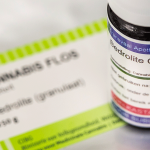Cannabis research
At Bedrocan we consider scientific cannabis research vital to progress medicinal cannabis to approved medicine status. To complement our cannabis plant and analytical research, we support clinical trials and offer our resources and experience to medicinal cannabis research projects worldwide. Below is a table of published research projects using Bedrocan cannabis products.
Cannabis research
Psychopharmacological studies in healthy participants
undertaken with Bedrocan products








